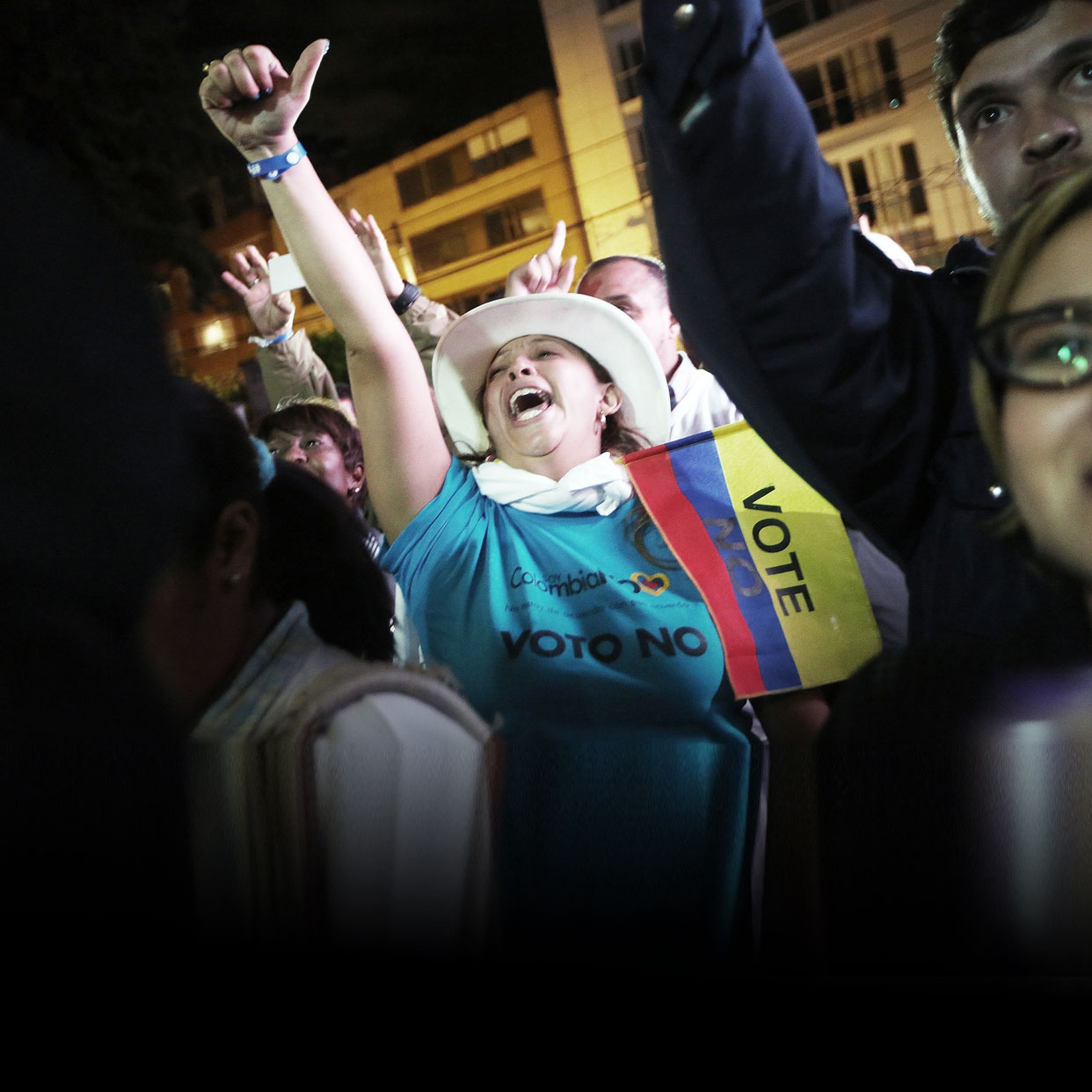Colombians reject deal to end Farc rebel war
Surprise referendum result risks prolonging armed conflict and plunging country into uncertainty

A free daily email with the biggest news stories of the day – and the best features from TheWeek.com
You are now subscribed
Your newsletter sign-up was successful
Voters in Colombia have moved against ratifying a peace deal between the government and Farc rebel forces, a shock referendum result narrowly rejecting the deal after four years of negotiations.
Polls "predicted yes would win with a comfortable margin of 66 per cent to 43 per cent", says The Guardian. But with counting complete from 98 per cent of polling booths, the No vote is ahead by 50.25 to 40.75 per cent, a difference of around 60,000 votes out of 13 million.
The result is "a surprise outcome that risks prolonging a 52-year-old armed conflict", says the Washington Post. It has also left President Juan Manuel Santos "politically crippled" and plunged the country into a period of uncertainty.
The Week
Escape your echo chamber. Get the facts behind the news, plus analysis from multiple perspectives.

Sign up for The Week's Free Newsletters
From our morning news briefing to a weekly Good News Newsletter, get the best of The Week delivered directly to your inbox.
From our morning news briefing to a weekly Good News Newsletter, get the best of The Week delivered directly to your inbox.
Santos said before the vote that there was "no plan B for ending the war". If he stands by his word, "the bilateral ceasefire will be lifted and the war will resume", says the BBC's Americas editor Leonardo Rocha.
However, Farc leaders believe the deal can be salvaged.
"The love we feel in our hearts is gigantic and with our words and actions [we] will be able to reach peace," they said.
Opposition to the peace accord was led by Alvaro Uribe, an influential former president who said the deal was "too soft on the Farc rebels by allowing them to re-enter society, form a political party and escape traditional jail sentences".
A free daily email with the biggest news stories of the day – and the best features from TheWeek.com
He and senior officials are now calling for the peace deal to be renegotiated, in defiance of Santos's insistence that a No victory would mean a return to war.
-
 The ‘ravenous’ demand for Cornish minerals
The ‘ravenous’ demand for Cornish mineralsUnder the Radar Growing need for critical minerals to power tech has intensified ‘appetite’ for lithium, which could be a ‘huge boon’ for local economy
-
 Why are election experts taking Trump’s midterm threats seriously?
Why are election experts taking Trump’s midterm threats seriously?IN THE SPOTLIGHT As the president muses about polling place deployments and a centralized electoral system aimed at one-party control, lawmakers are taking this administration at its word
-
 ‘Restaurateurs have become millionaires’
‘Restaurateurs have become millionaires’Instant Opinion Opinion, comment and editorials of the day
-
 Epstein files topple law CEO, roil UK government
Epstein files topple law CEO, roil UK governmentSpeed Read Peter Mandelson, Britain’s former ambassador to the US, is caught up in the scandal
-
 Iran and US prepare to meet after skirmishes
Iran and US prepare to meet after skirmishesSpeed Read The incident comes amid heightened tensions in the Middle East
-
 Israel retrieves final hostage’s body from Gaza
Israel retrieves final hostage’s body from GazaSpeed Read The 24-year-old police officer was killed during the initial Hamas attack
-
 China’s Xi targets top general in growing purge
China’s Xi targets top general in growing purgeSpeed Read Zhang Youxia is being investigated over ‘grave violations’ of the law
-
 Panama and Canada are negotiating over a crucial copper mine
Panama and Canada are negotiating over a crucial copper mineIn the Spotlight Panama is set to make a final decision on the mine this summer
-
 Why Greenland’s natural resources are nearly impossible to mine
Why Greenland’s natural resources are nearly impossible to mineThe Explainer The country’s natural landscape makes the task extremely difficult
-
 Iran cuts internet as protests escalate
Iran cuts internet as protests escalateSpeed Reada Government buildings across the country have been set on fire
-
 US nabs ‘shadow’ tanker claimed by Russia
US nabs ‘shadow’ tanker claimed by RussiaSpeed Read The ship was one of two vessels seized by the US military